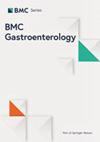教育程度与常见消化道疾病之间因果关系的遗传学估计及中介途径
IF 2.5
3区 医学
Q2 GASTROENTEROLOGY & HEPATOLOGY
引用次数: 0
摘要
教育、智力和认知能力与消化道疾病之间的关系已经得到证实。然而,各因素在这些疾病发病机制中的具体作用仍不确定。本研究采用多变量孟德尔随机法(MR)评估了芬兰基因组(FinnGen)和英国生物库(UK Biobank)欧洲裔人群中教育、智力和认知对胃肠道疾病的独立影响。采用两步MR法评估关联的中介效应。对来自 FinnGen 和英国生物库的 MR 估计值进行的 Meta 分析表明,1- SD(4.2 年)的高等教育与较低的胃食管反流(OR:0.58;95% CI:0.50-0.66)、消化性溃疡(OR:0.57;95% CI:0.47-0.69)、肠易激综合征(OR:0.57;95% CI:0.47-0.69)、胃溃疡(OR:0.57;95% CI:0.47-0.69)、肠易激综合征(OR:0.57;95% CI:0.47-0.69)的风险有因果关系。69)、肠易激综合征(OR:0.70;95% CI:0.56,0.87)、憩室疾病(OR:0.69;95% CI:0.61,0.78)、胆石症(OR:0.68;95% CI:0.59,0.79)和急性胰腺炎(OR:0.54;95% CI:0.41,0.72),与智力和认知能力无关。体重指数(3.7%-22.3%)、腰臀比(8.3%-11.9%)、体脂率(4.1%-39.8%)、空腹胰岛素(1.4%-5.5%)和重度抑郁症(6.0%-12.4%)是这些因果关系的中介。我们的研究结果表明,教育程度与六种常见消化道疾病之间存在因果关系和独立关系。此外,我们的研究还强调了五个中介因素,它们是预防与较低教育水平相关的消化道疾病的关键目标。本文章由计算机程序翻译,如有差异,请以英文原文为准。
Genetic estimation of causalities between educational attainment with common digestive tract diseases and the mediating pathways
The association between education, intelligence, and cognition with digestive tract diseases has been established. However, the specific contribution of each factor in the pathogenesis of these diseases are still uncertain. This study employed multivariable Mendelian randomization (MR) to assess the independent effects of education, intelligence, and cognition on gastrointestinal conditions in the FinnGen and UK Biobank European-ancestry populations. A two-step MR approach was employed to assess the mediating effects of the association. Meta-analysis of MR estimates from FinnGen and UK Biobank showed that 1- SD (4.2 years) higher education was causally associated with lower risks of gastroesophageal reflux (OR: 0.58; 95% CI: 0.50, 0.66), peptic ulcer (OR: 0.57; 95% CI: 0.47, 0.69), irritable bowel syndrome (OR: 0.70; 95% CI: 0.56, 0.87), diverticular disease (OR: 0.69; 95% CI: 0.61, 0.78), cholelithiasis (OR: 0.68; 95% CI: 0.59, 0.79) and acute pancreatitis (OR: 0.54; 95% CI: 0.41, 0.72), independently of intelligence and cognition. These causal associations were mediating by body mass index (3.7-22.3%), waist-to-hip ratio (8.3-11.9%), body fat percentage (4.1-39.8%), fasting insulin (1.4-5.5%) and major depression (6.0-12.4%). Our findings demonstrate a causal and independent association between education and six common digestive tract diseases. Additionally, our study highlights five mediators as crucial targets for preventing digestive tract diseases associated with lower education levels.
求助全文
通过发布文献求助,成功后即可免费获取论文全文。
去求助
来源期刊

BMC Gastroenterology
医学-胃肠肝病学
CiteScore
4.20
自引率
0.00%
发文量
465
审稿时长
6 months
期刊介绍:
BMC Gastroenterology is an open access, peer-reviewed journal that considers articles on all aspects of the prevention, diagnosis and management of gastrointestinal and hepatobiliary disorders, as well as related molecular genetics, pathophysiology, and epidemiology.
 求助内容:
求助内容: 应助结果提醒方式:
应助结果提醒方式:


